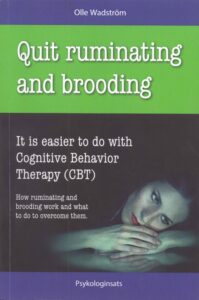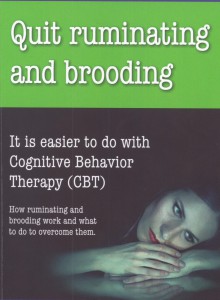 Ruminations can be likened to a game of tennis, where one side hits a frightening thought, and the calming side returns it with a comforting thought. Each time the “ball” comes over to the other side, it can be returned. The game can go on forever. Since we are intelligent beings, we keep finding new frightening aspects, or we get new irritating ideas, and find new comforting thoughts.
Ruminations can be likened to a game of tennis, where one side hits a frightening thought, and the calming side returns it with a comforting thought. Each time the “ball” comes over to the other side, it can be returned. The game can go on forever. Since we are intelligent beings, we keep finding new frightening aspects, or we get new irritating ideas, and find new comforting thoughts.
Ruminating is an internal dialogue, or discussion or debate.
Our ability to see new dangers leads to a never ending shift in the contents of ruminations, even if it is about the same subject or field.
Look at this example of how rumination can function. Let the tennis game begin.
Discomforting thoughts Comforting thoughts
- What if the interest rate increases?
The interest rate has not increased for a
year. - Sooner or later it is bound to increase. It has always been up and down. If it increases, our living costs will hit the ceiling and we will have to move.
No expert has talked about increased interest rates recently.
In the thirties, the stock market crashed and interest rates increased overnight without people knowing about it ahead of time, because if they did, they would have sold their stock shares before the crash.
Economists are more competent now, so that could not happen in such a surprising way these days.
But the monetary system is also more complicated now and, hence, more vulnerable. And if the interest rate increased by 2%, we might not be able to afford food. Then we will be forced to sell our house. We will be alright, one way or another. We will get plenty of money for our house if we sold it now.
- Then where would we move?
There are plenty of apartments in Olsberga.
In that case, the children will have to change schools, and they will lose all their friends.
There are probably many teachers that are better out there, and the children would not have as far to school.
They might get bullied.
Why would they? They have always been well liked and popular.
There are a lot of problems in Olsberga and my children might end up in a bad crowd and start smoking and drinking.
Why would they do that all of a sudden? That has not happened before.
If they do not make new friends, they might start hanging out with kids who do drugs.
And so on.
- And so on.
Ruminations can go on for a long time. There are really no boundaries for how long they might go on. Hereby, the intelligence and imagination of  human beings become a burden.
human beings become a burden.
This is an exerpt from the book Quit Ruminating and Brooding by Olle Wadström. Comments and discussions are encouraged.
The book is available in two similar versions. Please choose the green and black version or the black version of the book. The white version is illegally printed and sold by AuthorHouse/Author Solutions.

